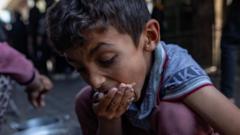Momodou Taal, a student at Cornell University, has decided to leave the U.S. rather than face deportation after his visa was revoked due to his involvement in protests against Israel. His decision reflects the growing concern over the Trump administration's actions against student activism related to international issues.
Trump Administration Forces International Student to Leave Amid Protest Crackdown

Trump Administration Forces International Student to Leave Amid Protest Crackdown
Cornell Graduate Momodou Taal Chooses Voluntary Departure Over Deportation
A graduate student at Cornell University, Momodou Taal, has opted to leave the United States instead of facing deportation following the revocation of his student visa, which was tied to his protest activities concerning the Israel-Gaza conflict. Taal, who holds dual citizenship in the UK and The Gambia, announced his decision via social media on Monday, asserting that he would "rather leave free and with my head held high" than be forcibly removed.
His visa was revoked as part of a broader initiative by the Trump administration that targets international students engaged in pro-Palestinian protests on U.S. campuses. Taal's departure follows a series of legal challenges against his deportation, which a judge recently denied. He expressed a diminished belief that he could rely on the legal system for safety or the freedom to express his views, stating, "I have lost faith I could walk the streets without being abducted."
Taal previously faced disciplinary actions from Cornell, including suspension, for his protest activities. His statements during the Israel-Gaza war, including public solidarity with "the armed resistance in Palestine from the river to the sea," contributed to the administration’s classification of his actions as antagonistic to U.S. foreign policy.
Secretary of State Marco Rubio confirmed that at least 300 student visas have been revoked due to involvement in similar activities. Officials maintain that the Immigration and Nationality Act supports such actions against non-citizens deemed opposed to U.S. national security interests. Critics have condemned these measures as infringements on free speech, drawing attention to the chilling effect on student activism.
In a similar vein, other international students have also fled the U.S. amid the ongoing crackdown. Indian student Ranjani Srinivasan recently shared her experiences, emphasizing her desire to return to her academic studies and clear her name against accusations of terrorism sympathies. The case has sparked discussions about the balance between national security and the rights of individuals to express political beliefs within academic settings.
This crackdown represents a critical intersection of immigration policy, international relations, and civil liberties within the United States, raising ongoing questions about the freedoms of expression and the treatment of international students engaged in political activism.


















